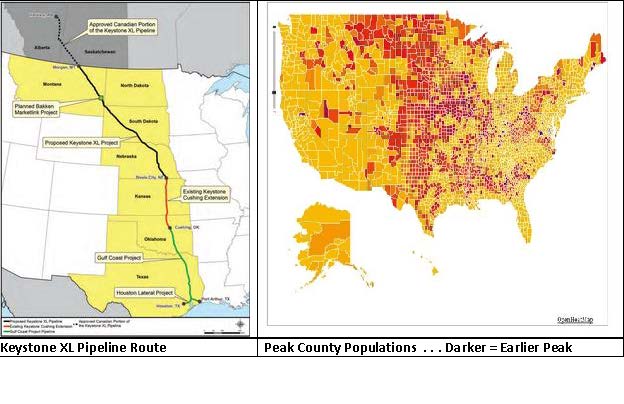Keystone Nation: Mapping the Politics of the Pipeline
Keystone XL would run through a column of Red States and depopulating counties.
Looking at three maps sheds some interesting light on the the politics of the Keystone XL pipeline. The pipeline’s geography resonates in an interesting way with political and demographic geography. We can start with two maps that show the proposed route (on the left) and the dates in which counties reached their peak populations.

You can immediately see that the pipeline runs through areas that have been losing population for an extended period of time. Now compare that to one more map, this time showing the familiar Red/Blue spectrum among states:

Again, we see the same column of states running through the middle of the country. And with the exception of Montana, which is turning a bit maroon, all are staunch Republican strongholds.
Of course, Republicans have many reasons to support Keystone XL, including their closeness to the fossil fuel industry,and their disbelief in climate change. But it’s also noteworthy that the direct and indirect construction jobs from the project are going to end up in red states. In addition, the hollowing out of much of this part of the country (with the notable exception of Texas) doesn’t matter in terms of the U.S. Senate. So issues like Keystone that play well in these states make political sense for the party, as well as fitting its ideological predilections. (Correspondingly, you can also see why the pipeline poses a problem for Democrats who are trying to maintain control of the Senate). The map of peak county populations also indicates, however, why the same GOP strategies don’t work as well in Presidential elections — the population is shifting away from those same areas.
Reader Comments
One Reply to “Keystone Nation: Mapping the Politics of the Pipeline”
Comments are closed.







It’s also interesting to note that quite a few of red states property owners are objecting to Keystone based on eminent domain. Here in Nebraska most resistance has come from farmers and ranchers, Republicans no doubt, than environmentalists.